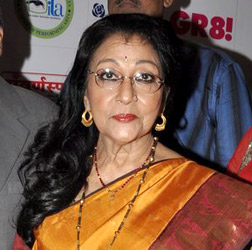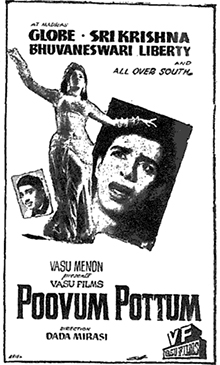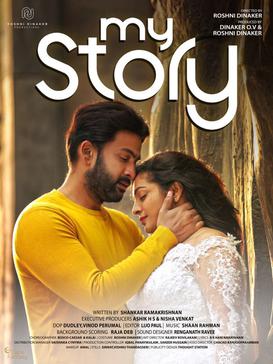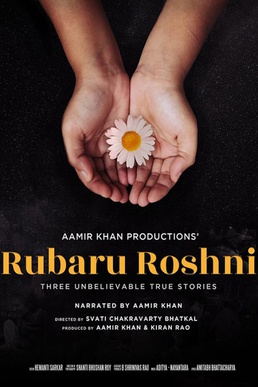Nai Roshni may refer to:
- Nai Roshni (1941 film), an Indian drama film
- Nai Roshni (1967 film), a Bollywood film
Nai Roshni may refer to:
Wong may refer to:

Ravi Shankar Sharma, often referred to mononymously as Ravi, was an Indian music director, who had composed music for several Hindi and Malayalam films.

Alda Sinha, better known by her stage name Mala Sinha is a former Indian actress who has worked in Hindi, Bengali and Nepali films. Initially starting her career with regional cinema, she went on to become a top leading actress in Hindi Cinema in the late 1950s, 1960s and early 1970s. In a career spanning four decades, Mala Sinha rose to prominence with films like Guru Dutt's Pyaasa (1957) and Yash Chopra's Dhool Ka Phool (1959). Later, she starred in over hundred film productions including Phir Subah Hogi (1958), Hariyali Aur Rasta, Anpadh, Dil Tera Deewana (1962), Gumrah, Bahurani, Himalay Ki God Mein (1965), Aasra (1966), Ankhen, Do Kaliyan, Maryada (1971). She was known as the "daring diva" and "torch bearer of women's cinema" for essaying strong female centric and unconventional roles in a range of movies considered ahead of their times. Having received multiple awards and nominations, she was given the Filmfare Lifetime Achievement Award in 2018.

Tanuja Samarth, known mononymously as Tanuja, is an Indian actress who predominantly works in the Hindi film industry. Part of the Mukherjee-Samarth family, she is the daughter of actress Shobhna Samarth and producer Kumarsen Samarth, and was married to filmmaker Shomu Mukherjee, with whom she has two daughters, actresses Kajol and Tanisha. A recipient of two Filmfare Awards, Tanuja is best known for her roles in the Hindi and Bengali films like Memdidi (1961), Deya Neya (1963), Chand Aur Suraj (1965), Baharen Phir Bhi Aayengi (1966), Jewel Thief (1967), Nai Roshni (1967), Antony Firingee (film) (1967), Pratham Kadam Phool (1969), Teen Bhubaner Pare (1969), Jeene Ki Raah (1969), Rajkumari (1970), Haathi Mere Saathi (1971), Anubhav (1971), Mere Jeevan Saathi (1972) and Do Chor (1972). Her pairings with actors Sanjeev Kumar, Rajesh Khanna, Dharmendra and Uttam Kumar were popular in the late 1960s and early 1970s.

Allauddinum Albhutha Vilakkum is a 1979 Indian fantasy film directed by I. V. Sasi, based on Aladdin's story from One Thousand and One Nights. The film stars Kamal Haasan, Rajinikanth, Jayabharathi and Sripriya, with Gemini Ganesan, Savitri and S. A. Ashokan in supporting roles. It was simultaneously filmed in Malayalam and Tamil languages, the latter as Allaudinaum Arputha Vilakkum which was released on 8 June 1979, two months after the Malayalam version which came on 14 April 1979.

The Ministry of Minority Affairs is the ministry in the Government of India which was carved out of the Ministry of Social Justice and Empowerment and created on 29 January 2006. It is the apex body for the central government's regulatory and developmental programmes for the minority religious communities and minority linguistic communities in India, which include Muslims, Sikhs, Christians, Buddhists, Zoroastrians (Parsis) and Jains notified as minority religious communities in The Gazette of India under Section 2(c) of the National Commission for Minorities Act, 1992.

Sulochana Latkar, known by her screen name Sulochana, was an Indian actress of Marathi and Hindi cinema, who acted in 50 films in Marathi and around 250 films in Hindi. She was most known for her performances in Marathi films such as Sasurvas (1946), Meeth Bhakar (1949), Vahinichya Bangdya (1953), Dhakti Jaoo (1958) and Sangte Aika (1959) in the lead roles, as well as for the mother roles she played in Hindi cinema right from 1959 film Dil Deke Dekho to the year 1995. She and Nirupa Roy epitomized the "mother" roles right from 1959 until the early 1990s.

Gumrah is a 1993 Indian Hindi-language action crime drama film directed by Mahesh Bhatt and written jointly by Sujit Sen and Robin Bhatt. It stars Sridevi, Sanjay Dutt, Anupam Kher, and Rahul Roy. In the film, Roshni (Sridevi), an aspiring singer, is assisted by Rahul Malhotra (Roy) in flourishing her career and they fall in love. However, on a trip to Hong Kong, she is abandoned by him and later arrested by the police for supposed involvement in trafficking cocaine.
Nais may refer to:

Nai Roshni is an Indian drama film directed by L. Mehta and Chiman Kant Gandhi. It was released in 1941 under the banner of National Studios. The film also had Baby Meena as a child artist.

Murder 3 is a 2013 Indian Hindi-language psychological thriller film. It is the third instalment in the Murder film series and sequel to the 2011 film, Murder 2. Directed by Vishesh Bhatt and produced by Mukesh Bhatt from Vishesh Films. This is the third installment in the series and unlike its predecessors, is an official remake of the Colombian thriller The Hidden Face. Murder 3 was released on 15 February 2013 to mixed reviews and was a flop.

Ivide is a 2015 Indian Malayalam crime drama film directed by Shyamaprasad. The film has Prithviraj Sukumaran, Nivin Pauly and Bhavana in lead roles. The film was shot mostly in Atlanta, U.S. The soundtrack and background score were composed by Gopi Sundar. Cinematography was done by Eric Dickinson and editing by Manoj. The film was released on 29 May 2015. Manoj was awarded Best Editor at the 2015 Kerala State Film Awards. The music label for the movie is Muzik24
Roshni or Roshini is a given name. Notable persons with that name include:
Roshni Dinaker is an Indian costume designer and filmmaker, who has worked in Kannada, Tamil, and Telugu film industries as designer, and her directorial debut with the Malayalam film My Story in 2018.

Poovum Pottum is 1968 Indian Tamil-language romantic drama film directed by Dada Mirasi and produced by Vasu Menon. The film stars S. V. Ranga Rao, A. V. M. Rajan, Muthuraman and Bhanumathi. It is a remake of the 1967 Hindi film Nai Roshni.

My Story is a 2018 Indian Malayalam-language romance film directed and produced by Roshni Dinaker and written by Shanker Ramakrishnan. The film stars Prithviraj Sukumaran and Parvathy Thiruvothu in the lead roles. It was released on 6 July 2018.

Nai Roshni is a 1967 Bollywood film starring Ashok Kumar, Raaj Kumar, Biswajeet, Mala Sinha, Tanuja in lead roles.

The Farewell is a 2019 American comedy-drama film written and directed by Lulu Wang. It stars Awkwafina, Tzi Ma, Diana Lin, and Zhao Shuzhen. The film follows a Chinese American woman named Billi, who learns her grandmother, Nai Nai, has only a short while left to live. Billi's family has decided to schedule a family gathering before Nai Nai dies, and not tell Nai Nai of her fatal illness.

Yehh Jaadu Hai Jinn Ka! is an Indian fantasy drama television series that aired from 14 October 2019 to 14 November 2020 on Star Plus. Produced by Gul Khan and Karishma Jain, it starred Vikram Singh Chauhan and Aditi Sharma.

Rubaru Roshni is a 2019 Indian anthology documentary film directed by Svati Chakravarty Bhatkal. Narrated by Aamir Khan and produced by Khan and Kiran Rao, it tells three real life stories in a first-person account of both the victims and the perpetrators of violence; the murders of Lalit Maken and his wife, the murder of Mariam Vattalil and the 2008 Mumbai attacks are covered. The documentary premiered on 26 January 2019 in seven languages on all Star Network channels, and later released through the streaming platforms Hotstar and Netflix.